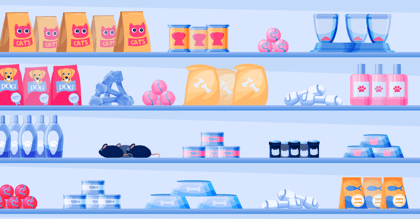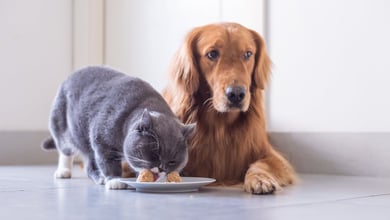Can Cats Be Vegan? The Impact of Veganism on Cats

Table of Contents
Imagine your feline friend purring beside a bowl filled with... lentils and carrots? As the vegan movement continues to grow, many cat owners are asking, 'Can cats join in on a vegan lifestyle?'
This is a question that piques curiosity and invites a deep dive into the dietary needs of our cherished companions.
Before you trade your cat's canned tuna for tofu, join us as we unravel the mystery surrounding the concept of veganism in cats, the physiological uniqueness of these captivating creatures, and how their nutritional needs align (or don't) with a plant-based diet.
Key Takeaways:
- Cats are obligate carnivores and have specific nutritional needs that require a diet rich in animal protein. They cannot thrive on a vegan diet.
- Consult with a veterinarian before considering a vegan diet for your cat to ensure their nutritional needs are met and their health is prioritized.
Can Cats Be Vegan?
No, cats should not be put on a vegan diet. Unlike dogs which are classified as omnivores, cats are obligate carnivores. This means cats have a biological need for a diet rich in animal protein. Their bodies have evolved to efficiently process meat, and they require specific nutrients that are found naturally in animal tissues.
While it's understandable that some pet owners may wish to extend their personal ethical or environmental choices to their pets, it's important to remember that cats' nutritional needs are different from humans'.
Cats rely on their owners to provide them with appropriate, nutritionally complete diets that cater to their unique dietary needs.
Health Concerns of a Vegan Diet for Cats
When a cat is fed a vegan diet, it may initially appear healthy, but over time, nutritional deficiencies can develop, leading to serious health problems.
Here's a look at some potential nutritional deficiencies and issues of vegan diets in cats:
1. Taurine Deficiency
Taurine is an essential amino acid for cats that's found primarily in animal tissues. A deficiency can lead to heart disease (specifically, dilated cardiomyopathy), reproductive problems, growth issues in kittens, and retinal degeneration, which can cause irreversible blindness.
2. Arachidonic Acid Deficiency
Arachidonic acid is a fatty acid that's crucial for cats. It plays a role in inflammation, skin health, and blood clotting. It's abundant in animal tissues but nearly absent in plant foods. A deficiency can affect the skin and coat, immune response, and overall health.
3. Vitamin A Deficiency
Unlike dogs and humans, cats cannot convert beta-carotene (found in plants) into vitamin A. They must obtain it directly from food, and it's most abundant in animal tissues. A deficiency can lead to skin problems, poor growth, and neurological issues.
4. B Vitamins Deficiency
Certain B vitamins, such as B12, niacin, and thiamine, are found in much higher quantities in animal-based foods. Deficiencies can result in a range of problems from poor appetite and growth to neurological issues and even death.
5. Alkaline Urine and Urinary Problems
Cats on a plant-based diet can develop more alkaline urine, which increases the risk of urinary tract infections and the formation of certain types of urinary stones.
6. Protein Deficiency and Imbalance
Cats require a higher protein intake than dogs and humans, and they need specific types of amino acids that are most abundant in animal proteins.
A low-protein diet or one with imbalanced amino acids can result in poor growth, muscle wasting, and other health issues.
Signs & Symptoms of Nutritional Deficiency in Cats
If you decided to switch your cat to a vegan or vegetarian diet, or are just not getting the correct amount of nutrients in their current diet, you may see the following symptoms of nutritional deficiencies in your cat:
-
Weight Loss: Cats may lose weight rapidly if they're not getting enough nutrients, despite having a normal or even increased appetite.
-
Poor Coat Condition: The cat's fur may become dull, brittle, or dry. They may also have excessive shedding or hair loss.
-
Gastrointestinal Problems: Cats may experience diarrhea, constipation, or other digestive issues.
-
Weakness and Lethargy: If cats are not getting adequate nutrition, they may show signs of decreased energy, weakness, and reluctance to play or move around.
-
Behavioral Changes: You may notice changes in your cat's behavior such as increased aggression or unusually quiet or withdrawn behavior.
-
Eye Problems: A deficiency in certain nutrients, like taurine, can lead to eye problems including cloudiness or diminished vision.
-
Heart Problems: A lack of certain nutrients, particularly taurine, can lead to a form of heart disease called dilated cardiomyopathy in cats.
Feeding cats a vegan diet without ensuring all their nutritional needs are met can lead to serious health problems, including heart disease, liver and kidney issues, coat and skin conditions, and even blindness and death.
Therefore, a vegan diet is generally not recommended for cats. If a pet owner is determined to explore this route, it should only be attempted under close veterinary supervision to monitor for potential health issues and nutritional deficiencies.
The health and well-being of the cat must always be the priority.
Summing Up a Vegan Diet for Cats
In conclusion, while the idea of a vegan lifestyle may align with the values of many pet owners, it's important to recognize that our feline friends have distinct nutritional requirements that can't be adequately met by a vegan diet.
Cats, as obligate carnivores, need specific nutrients, such as taurine, arachidonic acid, and vitamin A, which are primarily found in animal tissues.
Not providing these crucial nutrients can lead to significant health problems and a lowered quality of life.
Before making any major changes to your cat's diet, it's essential to have a comprehensive nutritional consultation with your veterinarian to ensure that your cat's nutritional needs are being met and their health is prioritized.
As responsible cat owners, it's our duty to provide diets that align with their species-specific needs, even if it means compromising our personal dietary preferences. In the grand scope of animal welfare, prioritizing the health and well-being of our pets should always take precedence.
Frequently Asked Questions
Can kittens be vegan?
Just like adult cats, kittens cannot be vegan. In fact, it may be even more crucial for kittens to consume a diet rich in animal proteins and specific nutrients found primarily in animal tissues because they are in a crucial stage of growth and development.
Can cats be on a vegetarian diet?
Just like with a vegan diet, a strictly vegetarian diet is not suitable for cats. While it's possible to supplement a vegetarian diet with these nutrients, it's challenging to achieve the right balance and cats can still develop deficiencies that can lead to serious health problems. In particular, a lack of taurine can cause severe heart disease in cats.
Is there a difference between a cat being vegan and a vegetarian?
Yes, there is a difference between a vegan and a vegetarian diet for cats. A vegetarian diet excludes meat but can include animal-derived products such as eggs and dairy. A vegan diet, on the other hand, excludes all animal-derived products, including eggs, dairy, and often honey.






